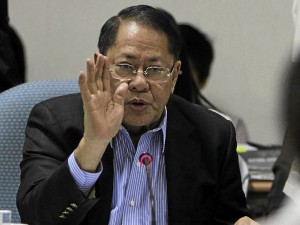Filipino diplomats who can’t be bothered to learn even a smidgen of the language of their host countries have no place being in the foreign service, a senator has said.
Sen. Edgardo Angara, at last week’s Senate hearing on the 2013 budget of the Department of Foreign Affairs, proposed the creation of a Foreign Service Institute to train envoys in the intricacies of representing the country abroad.
“We get dismayed that some people receive (foreign) postings not even knowing the language used in the post,” Angara said.
“I think it’s really a shame like when I meet Thai diplomats and they speak the language of Madrid and elsewhere so fluently,” he added.
Foreign Secretary Albert del Rosario could only agree with Angara.
He said that in Southeast Asia alone, the quality of the career officers in the foreign service of many countries had “significantly improved.”
“In some ways, I feel we are behind in educating our career officers. I see that there are many officials in foreign ministries (of other countries who) have doctorates and master’s degrees. We do need to focus on staying or catching up with that, if possible, get ahead of the curve,” Del Rosario told the senators.
The concern over the quality of Filipino envoys, especially those who get their posts due to political considerations, has always been an issue in the local diplomatic community.
Commission on Appointments (CA) members have confronted diplomatic nominees about being proteges or proxies of the politicians who had maneuvered for their appointments.
Professional officers who have spent a lifetime building careers in the foreign service find it demoralizing when undeserving political appointees are named to crucial postings, the CA found.
Del Rosario, however, assured the senators the DFA had adopted standards that gave more weight to performance in assessing merit within the agency.
“Now we are saying to everyone we are implementing a merit-based establishment (where) performance comes before and is more important that seniority,” the secretary said.
Del Rosario said the DFA had also partnered with certain institutions in an effort to “look for means to train people as quickly as possible.”
For example, officers being trained in economic diplomacy are made to undergo courses at the Asian Institute of Management “to be able to pass a career minister’s test.”
Del Rosario said the game plan was to look for “additional funding and a suitable allocation” so that foreign officers would “become better educated.”
Angara urged the DFA to examine multilateral agreements with countries like South Korea and Australia, as well as global institutions such as the World Bank, Asian Development Bank and United Nations Development Fund, for possible funding.
“They are quite generous with other countries yet we support them through tax waivers and exemptions … I think that if we activate a Foreign Service Institute and create that kind of office, just seeking grants and networking (with international benefactors), we can build a good diplomatic school within our own department,” Angara said.


